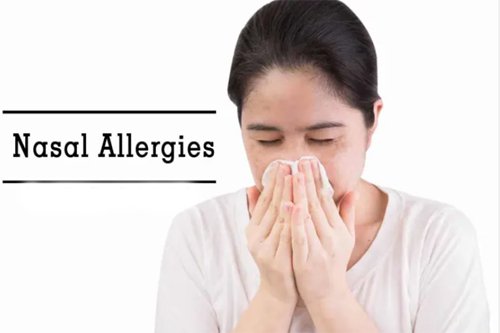Brain and ENT Clinic – Dr Lalit Mahajan In Nagpur & Dr Rachna Gangwani Mahajan In Nagpur
Nasal Allergies

Nasal allergies, also known as allergic rhinitis or hay fever, are a type of allergic reaction that affects the nose. This condition occurs when the immune system overreacts to airborne allergens, such as pollen, dust mites, pet dander, or mold spores. When a person with nasal allergies comes into contact with these allergens, their immune system releases chemicals, such as histamine, which lead to symptoms.
Management of nasal allergies may involve avoiding allergens when possible, using over-the-counter or prescription antihistamines, nasal corticosteroids, decongestants, and in some cases, immunotherapy (allergy shots) to desensitize the immune system to specific allergens.These symptoms can vary in intensity and may be seasonal or perennial, depending on the specific allergens triggering the reaction.
Common symptoms of Nasal Allergies
- Sneezing: Frequent and repetitive sneezing is a common symptom.
- Runny or stuffy nose: The nasal passages may become congested or produce excess mucus.
- Itchy nose, eyes, and throat: Itchiness is a common allergic reaction.
- Watery eyes: Excessive tearing or watering of the eyes can occur.
- Coughing: A persistent cough may be present.
Treatment for Nasal Allergies
Allergen Avoidance:
- Identify and try to avoid the allergens triggering your nasal allergies. Common allergens include pollen, dust mites, pet dander, and mold.
- Use allergen-proof pillow and mattress covers.
- Keep windows closed during high pollen seasons.
- Use air purifiers with HEPA filters to reduce airborne allergens.
Medications:
- Antihistamines: These drugs help block the effects of histamine, a chemical released during an allergic reaction. They can be taken orally (pills or liquid) or as nasal sprays.
- Decongestants: These drugs reduce nasal congestion by narrowing blood vessels. They are available as oral medications or nasal sprays. However, nasal spray decongestants should be used with caution to avoid rebound congestion if used for more than a few days.
- Corticosteroid Nasal Sprays: These reduce inflammation in the nasal passages. They are often considered a first-line treatment for nasal allergies and may take a few days to reach their full effect.
- Leukotriene Inhibitors: These are another class of medications that can help manage allergic rhinitis.
Nasal Irrigation:
- Saline nasal irrigation with a neti pot or saline nasal sprays can help flush out allergens and mucus, providing relief.
Immunotherapy:
- Allergy shots or sublingual tablets are forms of immunotherapy that aim to desensitize the immune system to specific allergens. This is often recommended for individuals with severe or persistent allergies.
Prescription Medications:
- In some cases, your healthcare provider may prescribe stronger medications or a combination of medications to better manage your symptoms.
